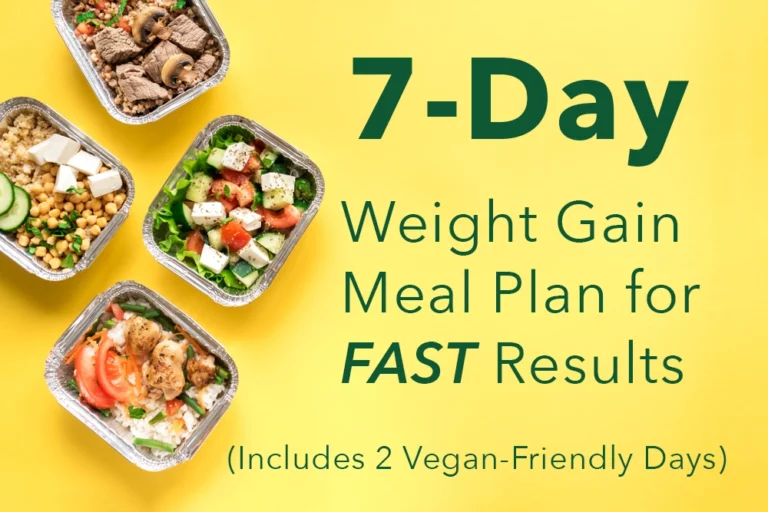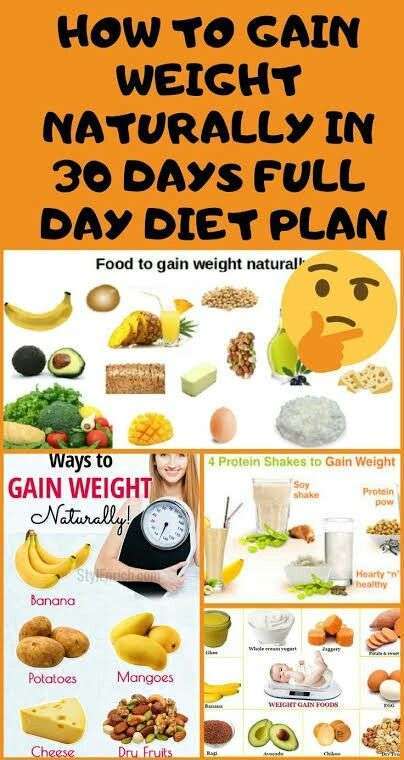Are you looking to pack on some pounds in a healthy and sustainable way? Look no further! Our 7-Day Meal Plan for Weight Gain is here to guide you through delicious and nutritious meals that will help you reach your goals. Say goodbye to empty calories and hello to a balanced diet designed to support muscle growth and overall wellbeing. Let’s dive in together and start nourishing your body for success!
Introduction to Weight Gain and Healthy Eating
Many people struggle with gaining weight, especially in a healthy way. While there is a lot of focus on losing weight, it’s important to remember that gaining weight can also have its own health benefits. Whether you’re trying to build muscle or simply looking to reach a healthier weight, it’s essential to approach weight gain with the same level of care and attention as one would approach weight loss.
Healthy eating plays an integral role in achieving successful and sustainable weight gain. Not only does it provide the necessary nutrients for your body to function at its best, but it also helps ensure that the extra calories consumed are nourishing rather than empty calories from unhealthy foods.
Unfortunately, many people associate weight gain with unhealthy habits such as overeating junk food and not exercising enough. However, this approach not only leads to temporary results but can also have negative impacts on overall health in the long term.
In this section, we will explore some essential concepts related to healthy eating for proper weight gain. This includes understanding calorie intake, macronutrient ratios, nutrient-dense foods, and meal planning strategies.
Understanding Calorie Intake:
The first step in gaining healthy weight is understanding your daily calorie needs. Your daily calorie intake should be based on factors such as age, gender, height, activity level and current weight goal. It’s essential to consume more calories than your body burns through physical activity in order for your body to put on lean mass.
Macronutrient Ratios:
While consuming more calories is crucial for gaining weight, ensuring that these additional calories come from a balanced ratio of macronutrients is equally important. A well-rounded diet consists of carbohydrates for energy production; protein for building and repairing muscle tissue; and fats for hormone regulation and cell growth.
Choosing Nutrient-Dense Foods:
When aiming for healthy weight gain, it’s vital that the excess calories come from nutritious foods rather than high-calorie junk foods. Nutrient-dense foods include whole grains, lean proteins, fruits and vegetables, healthy fats and dairy products.


Meal Planning Strategies:
Having a meal plan in place can help ensure that you are consuming the necessary amount of calories and nutrients each day. Meal planning allows for mindful food choices and sets one up for success on their weight gain journey.
Healthy eating is an essential aspect of gaining weight in a sustainable manner. By understanding calorie intake, macronutrient ratios, choosing nutrient-dense foods, and having a meal planning strategy in place, one can achieve successful weight gain while promoting overall health and wellness.
Understanding Your Body’s Caloric Needs for Weight Gain
- Understanding Your Body’s Caloric Needs for Weight Gain
When it comes to achieving weight gain, it is important to understand your body’s caloric needs. Simply put, calories are units that measure the energy stored in food and beverages that we consume. Our bodies require a certain number of calories each day to function properly and maintain our current weight.
However, when attempting to gain weight, it is essential to consume more calories than your body burns in order to create a calorie surplus. This excess intake of calories supplies the necessary fuel for our bodies to support muscle growth and increase overall body mass.
So how do you determine your specific caloric needs for weight gain? It ultimately depends on several factors such as age, gender, height, activity level, and goals. One way is by calculating your Basal Metabolic Rate (BMR), which is the number of calories your body needs to perform basic functions such as breathing and circulation at rest. This can be done using an online BMR calculator; however, keep in mind that this method provides only a general estimate.
Another way is by using the Harris-Benedict equation which takes into account one’s BMR along with their daily physical activity level. This equation has different formulas for males and females as well as different levels of physical activity from sedentary (little or no exercise) to very active (intense exercise or training). By inputting these values into the formula along with age and weight, you can calculate an estimated daily caloric need.
It’s worth noting that these calculations aren’t perfect and may need adjustments depending on individual factors such as metabolism rate or medical conditions affecting digestion. To ensure accuracy in determining your personal caloric needs for weight gain, consider consulting a registered dietitian who can provide a personalized meal plan based on your specific goals and health status.
In general, experts recommend consuming an additional 500-1000 calories per day to gain weight. However, this may vary depending on your body’s response and rate of weight gain. It is important to track your progress and adjust calorie intake accordingly.
Understanding your body’s caloric needs is crucial for effective weight gain. Calculating and adjusting your daily calorie intake can put you on the right track towards reaching your desired goals in a healthy way. Next, let’s dive into a detailed meal plan that will help you achieve safe and sustainable weight gain.
Creating a 7-Day Meal Plan for Weight Gain: A Step-by-Step Guide to Healthy Eating
When it comes to gaining weight, many people focus on consuming high-calorie and unhealthy foods. However, this can lead to negative effects on both physical and mental health in the long run. Instead, creating a well-balanced meal plan that includes nutritious and calorie-dense foods is crucial for healthy weight gain.
In this guide, we will take you through a step-by-step process of creating a 7-day meal plan specifically designed for weight gain. Follow these simple steps to ensure that your body is getting the right nutrients and calories to support healthy weight gain.
Step 1: Determine Your Calorie Needs
The first step towards creating a successful meal plan for weight gain is to determine how many calories your body needs daily. This number may vary depending on factors such as age, gender, height, activity level, and current weight. You can use online calculators or consult with a nutritionist to get an accurate estimate of your calorie needs.
Step 2: Divide Your Meals into Smaller Portions
Instead of having three large meals per day, divide your meals into smaller portions spread throughout the day. This will help you consume more calories without feeling uncomfortably full after each meal. Aim for at least six meals per day – breakfast, mid-morning snack, lunch, afternoon snack, dinner and evening snack.
Step 3: Include Protein-rich Foods in Every Meal
Protein is essential for building muscle mass and promoting overall growth in the body. Make sure every meal contains protein sources such as lean meats like chicken and fish; plant-based options like tofu or beans; dairy products like Greek yogurt or cottage cheese; or eggs if you are not following a vegetarian diet.
Step 4: Load Up on Carbohydrates
Carbohydrates are another crucial component in any weight-gain diet as they provide the body with energy. Complex carbohydrates found in whole grains, fruits and vegetables should make up the majority of your carbohydrate intake. However, it is also essential to include some simple carbohydrates such as honey or fruit juices to increase your calorie intake.
Step 5: Incorporate Healthy Fats
Including healthy fats in your diet can help boost your calorie intake while providing essential nutrients for overall health. Good sources of healthy fats include avocados, nuts and seeds, olive oil, and fatty fish like salmon.
Step 6: Stay Hydrated
Drinking enough water throughout the day is important for maintaining proper bodily functions and promoting weight gain. Make sure you stay hydrated by drinking at least eight glasses of water daily.
Following these steps will help you create a balanced and nutritious meal plan that supports healthy weight gain. Remember to be patient with yourself and trust the process – consistent adherence to this meal plan combined with regular exercise will ultimately lead to achieving your desired weight goals.
Day 1: Breakfast, Lunch, Dinner, Snacks
As they say, breakfast is the most important meal of the day. And when it comes to weight gain, a nutrient-dense breakfast can provide you with the necessary fuel and energy to kickstart your day. To begin your weight gain journey on the right track, it is crucial to include a well-balanced and protein-rich breakfast in your meal plan.
For Breakfast:
Start your day with a hearty bowl of oatmeal topped with fruits and nuts or scrambled eggs with whole wheat toast. Oatmeal is an excellent source of complex carbohydrates and fiber, while eggs are packed with high-quality protein. You can also add in some Greek yogurt for an extra dose of protein and probiotics.


For Lunch:
The key to gaining weight healthily is to have frequent meals throughout the day rather than consuming large quantities at once. For lunch, opt for a combination of lean proteins like chicken or fish along with complex carbs like brown rice or quinoa. Add in some roasted vegetables for essential vitamins and minerals.
For Dinner:
Dinner should be similar to lunch but with slightly larger portions. Incorporate foods rich in healthy fats such as salmon or avocado into your meal. These healthy fats not only help in gaining weight but also provide numerous benefits such as improved heart health.
For Snacks:
Snacking plays a crucial role when it comes to gaining weight. Instead of reaching for unhealthy junk food options, choose nutritious snacks that can help you reach your weight gain goals. Some great snack options are peanut butter on whole wheat crackers, hummus with vegetables, or homemade trail mix consisting of nuts and dried fruits.
It is essential to listen to your body’s hunger cues throughout the day and make sure you are fueling yourself adequately during each mealtime. Do not skip meals as this can hinder progress towards reaching your desired weight goal.
Remember that every individual’s nutritional needs may vary, so it is crucial to consult a registered dietitian or nutritionist to tailor your meal plan according to your specific requirements. Also, do not shy away from indulging in occasional treats and incorporating them into your meal plan in moderation.
Stay hydrated throughout the day by consuming plenty of water and other healthy drinks like smoothies or shakes. Adequate hydration helps with digestion and ensures that all the nutrients are properly absorbed by the body.
Day 1 of this weight gain meal plan focuses on providing you with nutrient-dense meals full of complex carbohydrates, lean proteins, and healthy fats. By following this carefully planned out meal schedule along with regular exercise, you will be well on your way to achieving a healthy weight gain journey.
- Day 2: Breakfast, Lunch, Dinner, Snacks
Day 2: Breakfast, Lunch, Dinner, Snacks
As we embark on day two of our weight gain meal plan, it is important to continue incorporating nutrient-dense meals and snacks into our daily routine. This will help us achieve our goal of gaining weight in a healthy and sustainable manner.
Breakfast:
To kick-start your day with energy and nourishment, try starting with a hearty breakfast that includes a balance of carbohydrates, protein, and healthy fats. Good options for breakfast include oatmeal with nuts and fruits, whole grain toast with avocado or nut butter, or scrambled eggs with veggies.
Lunch:
For lunch, focus on choosing complex carbohydrates such as brown rice or quinoa alongside lean protein sources like grilled chicken breast or tofu. Add variety to your meal by including a side salad loaded with different colored vegetables and topped with a homemade vinaigrette dressing.
Dinner:
For dinner, aim for similar components as lunch but feel free to switch up the ingredients to keep things interesting. A baked sweet potato topped with chili made from lean ground turkey and beans is a delicious option that provides you both carbs and proteins. You can also experiment with incorporating different types of seafood such as salmon or shrimp for added healthy fats.
Snacks:
In between meals, be sure to snack on healthy options that provide you an extra boost of calories and nutrients. Nut butter paired with apple slices or carrots sticks are great choices for those looking for something quick yet satisfying. Greek yogurt mixed with granola and berries also makes for a nutritious snack packed with protein.
It is crucial not to skip meals or snacks during this journey towards weight gain. Consistently fueling your body throughout the day will help increase your calorie intake while providing necessary nutrients that support muscle growth.
Additionally, staying hydrated is essential when trying to gain weight as water aids in digestion while keeping you energized throughout the day. Be sure to drink plenty of water and incorporate hydrating snacks like fruits and vegetables into your diet.
A well-rounded meal plan consisting of balanced breakfasts, lunches, dinners, and nutritious snacks is essential for healthy weight gain. Remember to listen to your body’s hunger cues and adjust portion sizes accordingly. Keep up the hard work and stay consistent with these healthy eating habits to reach your weight gain goals.
- Day 3: Breakfast, Lunch, Dinner, Snacks
Day 3: Breakfast, Lunch, Dinner, Snacks
On day 3 of our weight gain meal plan, we will be focusing on balancing out our meals with nutrient-dense options that will fuel your body and aid in healthy weight gain. As mentioned before, the key to successful weight gain is not just increasing your calorie intake but ensuring that those calories come from whole foods rich in protein, complex carbohydrates, and healthy fats.
Breakfast:
For breakfast, we recommend starting your day with a protein-packed smoothie. Blend together 1 banana, 1 cup of Greek yogurt, 1 tablespoon of almond butter, and a handful of spinach or kale for an extra dose of vitamins and minerals. You can also add in a scoop of whey protein powder for an additional protein boost.
Lunch:
For lunchtime, let’s focus on incorporating complex carbs into our meal. A hearty turkey sandwich on whole wheat bread with avocado and hummus would be a great option. You can also add in some baby carrots or bell pepper slices as snacks to keep you satisfied until dinner.
Dinner:
For dinner, it’s important to include lean proteins such as chicken breast or fish along with some starchy vegetables like sweet potatoes or quinoa to help increase muscle mass. A delicious option could be grilled salmon served with roasted sweet potato wedges and steamed broccoli. This meal provides a good balance of macronutrients while being both nutritious and filling.
Snacks:
As always snacking throughout the day is essential for adequate calorie intake when trying to gain weight healthily. Some ideal snack options include trail mix made with nuts and dried fruits (dates are particularly high in calories), energy bars made from oats and nut butter or apple slices topped with peanut butter.
It’s crucial to mention that portion control is still necessary even when trying to gain weight. While it may seem tempting to go overboard at mealtimes, it’s vital to listen to your body’s hunger and fullness cues and stop eating when you are satisfied. Overeating can lead to feelings of discomfort and may hinder your progress in the long run.
Day 3 of our weight gain meal plan focuses on incorporating nutrient-dense options into each meal while also keeping in mind portion control. By being conscious of what we eat and making mindful choices, we can continue on our journey towards a healthier weight gain without sacrificing nutrition or taste. Stay tuned for day 4 where we will explore more delicious and satisfying meals to support healthy weight gain.
- Day 4: Breakfast, Lunch, Dinner, Snacks
Day 4: Breakfast, Lunch, Dinner, Snacks
Welcome to day 4 of our weight gain meal plan! By now, you may have noticed a slight increase in your appetite and energy levels. This is a great sign that your body is responding well to the increased calorie intake. Today’s meals will continue to provide essential nutrients and help support healthy weight gain.
Breakfast:
Start your day with a hearty breakfast that will keep you feeling full and energized until lunchtime. For this meal, we recommend having scrambled eggs with avocado toast and a side of Greek yogurt topped with fruits. The eggs provide high-quality protein while the avocado adds healthy fats and fiber. The Greek yogurt not only adds more protein but also beneficial probiotics for gut health. Top it off with some fruits like banana, strawberries or blueberries for added vitamins and minerals.
Lunch:
For lunch, we suggest having a tuna wrap with sweet potato fries on the side. Tuna is an excellent source of lean protein while sweet potatoes are packed with complex carbohydrates for sustained energy throughout the day. Add some mixed greens to your wrap for additional nutrients and fiber.
Dinner:
For dinner, enjoy grilled chicken breast with quinoa and roasted vegetables such as broccoli, carrots, and bell peppers. Chicken breast is another great source of lean protein, while quinoa provides complex carbs along with beneficial vitamins and minerals. Roasted vegetables add fiber and essential antioxidants to your meal.
Snacks:
As always, don’t forget about snacks between meals! These are crucial in helping you meet your daily calorie goal. Some healthy options for snacks include hummus dip with whole-grain crackers or veggies, trail mix containing nuts and dried fruit, or apple slices spread with peanut butter.
Hydration:
Remember to stay hydrated throughout the day by drinking plenty of water or herbal tea without added sugar or caffeine. Hydration is vital for overall health as well as muscle-building and weight gain.
Incorporating these meals into your daily eating habits will provide you with a well-rounded and balanced diet necessary for healthy weight gain. It’s essential to remember that every person’s calorie needs are different, so listen to your body’s hunger and fullness cues to make adjustments as needed. Stay consistent, patient, and focused on nourishing your body with whole, nutrient-dense foods for optimal weight gain results. Keep up the good work!
Day 5:
Day 5 of the meal plan for weight gain focuses on providing your body with necessary nutrients and calories to continue building muscle mass. This day’s meals will also help to prevent fatigue and keep you feeling energized.
Breakfast:
Start your morning off with a protein-rich breakfast such as scrambled eggs with avocado toast or a spinach and mushroom omelette. Pair this with a serving of whole grain toast or oatmeal to add complex carbohydrates to your meal. A glass of fresh orange juice will provide some vitamin C and energy-boosting sugars.
Snack:
For a mid-morning snack, opt for a fruit smoothie made with Greek yogurt, banana, mixed berries, and a spoonful of peanut butter. This combination is not only delicious but also provides essential proteins, fats, and vitamins.
Lunch:
A hearty lunch meal should include lean protein like chicken or fish paired with brown rice or quinoa. Add some steamed vegetables like broccoli or carrots for added fiber and nutrients. You can also switch it up by making a wrap filled with grilled chicken strips, hummus, lettuce, tomatoes, and avocado slices.
Snack:
As an afternoon snack before your workout session, have a pre-workout shake made with milk or almond milk, whey protein powder, oats, and frozen banana blended together. This provides the perfect balance of carbohydrates and protein to fuel your workout without feeling too heavy on your stomach.
Dinner:
For dinner option 1: Grill salmon served with sweet potatoes and roasted brussels sprouts.
Or
Option 2: Baked chicken breast accompanied by roasted root vegetables like beets, parsnips,sprinkle nuts/seeds on top
After-dinner Snack:
Before bed is the perfect time to boost muscle recovery by having a bowl of Greek yogurt topped with granola or mixed nuts instead of just reaching for sugary snacks that do not provide nutritional value. The casein protein in Greek yogurt helps repair your muscles while you sleep.
Staying properly hydrated is crucial for weight gain, so make sure to drink plenty of water throughout the day. Aside from meals and snacks, you can also incorporate high-calorie drinks like smoothies, homemade juices, or milkshakes into your daily intake.
This meal plan focuses on incorporating whole foods that are nutrient-dense and calorie-rich to aid in weight gain and muscle building. Remember to listen to your body’s needs and adjust portion sizes accordingly. With a consistent and balanced approach to nutrition, you will reach your weight gain goals in no time.




